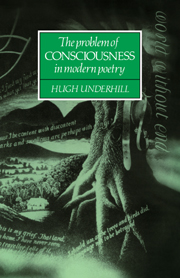Book contents
- Frontmatter
- Contents
- Preface
- Introduction: the inward revolution
- 1 From Georgian origins to ‘Romantic primitivism’: D. H. Lawrence and Robert Graves
- 2 Strangers to nature: modern nature poetry and the rural myth
- 3 The ‘poetical character’ of Edward Thomas
- 4 ‘Myself must I remake’: W. B. Yeats
- 5 ‘Here and now cease to matter’: T. S. Eliot
- 6 The work of Man: Louis MacNeice and W. H. Auden
- 7 ‘Nothing of our light’: Ted Hughes
- Conclusion
- Notes
- Select bibliography
- Index
7 - ‘Nothing of our light’: Ted Hughes
Published online by Cambridge University Press: 18 December 2009
- Frontmatter
- Contents
- Preface
- Introduction: the inward revolution
- 1 From Georgian origins to ‘Romantic primitivism’: D. H. Lawrence and Robert Graves
- 2 Strangers to nature: modern nature poetry and the rural myth
- 3 The ‘poetical character’ of Edward Thomas
- 4 ‘Myself must I remake’: W. B. Yeats
- 5 ‘Here and now cease to matter’: T. S. Eliot
- 6 The work of Man: Louis MacNeice and W. H. Auden
- 7 ‘Nothing of our light’: Ted Hughes
- Conclusion
- Notes
- Select bibliography
- Index
Summary
Ted Hughes's poetry is quite at odds with Auden's kind of de-romanticizing humanism, with its import that the Redeemer works in very worldly ways. Hughes gives the salient expression in the latter part of the century, among British poets anyway, to the Romantic primitivism I have examined in Lawrence and Graves. ‘Like most men today, he is a stranger to nature’: that estrangement is Ted Hughes's obsessive theme. Early on much affected by Yeats, he is not like Yeats an occult poet because for Hughes the supernatural is simply the natural. True, the oracular experience, the cycle of death and rebirth, the journey through a spirit world, these traditional motifs inspire Hughes's mythographies as they do Yeats's and those of other modern poetic mythmakers. There is a direct link with such poems as ‘Instructions to the Orphic Adept’ and ‘Medlars and Sorb-Apples’, while his poetry's account of the sickness of modern civilization and of a necessary quest for renewal places it in a large ‘modern’ context. ‘How can a poet become a medicine man and fly to the source and come back and heal or pronounce oracles?’ Hughes has asked, echoing the close of Graves's ‘Instructions’. In Gaudete the Reverend Lumb returns from the other world possessing oracular power. Hughes notably conceives of the passage through the underworld as an Orphic-like process of dismemberment followed by renewal.
- Type
- Chapter
- Information
- The Problem of Consciousness in Modern Poetry , pp. 269 - 299Publisher: Cambridge University PressPrint publication year: 1992



